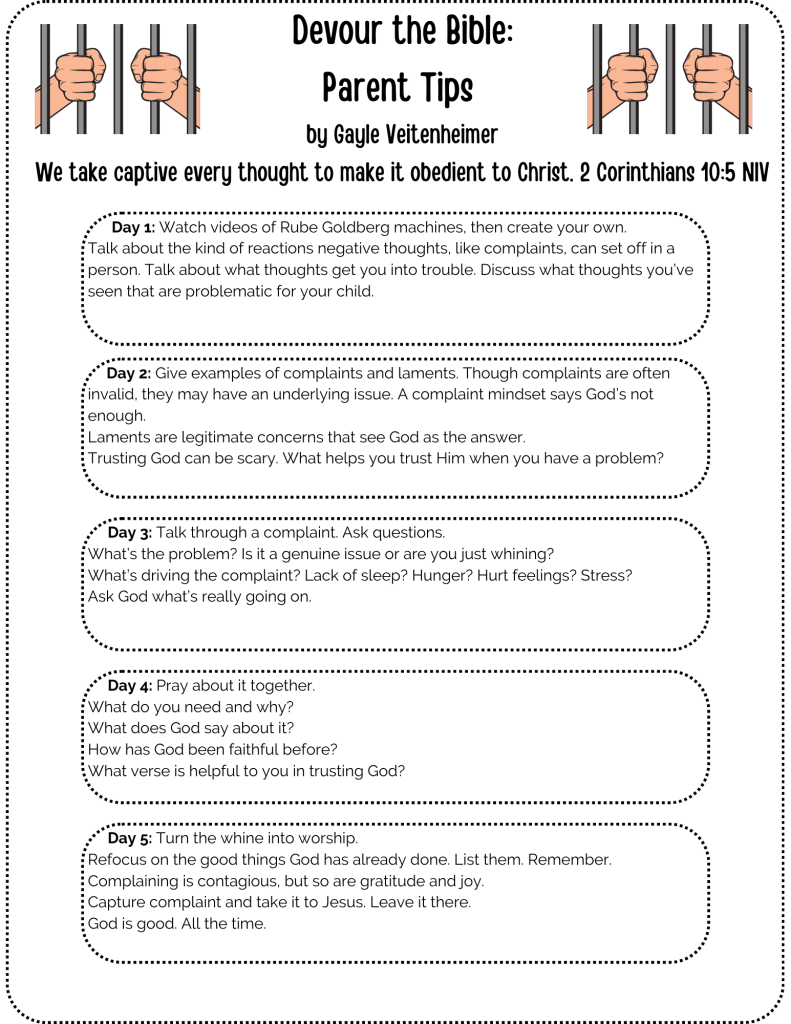How to Capture Your (and Your Kid’s) Complaints

We take captive every thought to make it obedient to Christ. 2 Corinthians 10:5 NIV
As summer approaches, what do you plan to capture?
Moments with growing kids?
Memories with friends and family?
How about thoughts? No, not the ones you add to the to-do list before you forget.
Out-of-bound thoughts.
Like complaints.
Complaints are the Rube Goldberg machine of emotions and attitudes, setting off a chain reaction that can leave us in a world of hurt.
Like my mom. Mom has dementia. It impacts her short-term memory. Thoughts stay with her less than a minute. When she can’t recall what just happened, she gets frustrated.
Understandable, but her default is negativity. Anger. Complaints. About almost everything.
Mom recently had an eye exam, and she needed new glasses. After trying on a handful of frames, she chose her favorite. When they came in two weeks later, we went to pick them up. Mom had them fitted, and she was good to go.
Until she got home.
Mom couldn’t remember where the new glasses had come from—or that she had selected the frames herself. What spewed out at me was a stream of angry complaints. She couldn’t find the old glasses, the only pair she’d ever had. (One pair? Really, Mom? You’re 81.) She hated the new frames. There was no way she would ever have chosen that color, and she was mad as hell (her words). Sigh.
Down, down, down, she spiraled.
And she’ll take me with her, because my frustration grows as does my distress from seeing her so upset. Her downward spiral tugs at me—unless I capture my thoughts.
Complaints are tied to dissatisfaction, a grievance of some kind. While some complaints have merit, other complaints are, well, as whiny as summer mosquitoes.
Fine Whine
Let’s introduce our first category: whine, whine, whine. This is an invalid complaint. You’re familiar with these. I’m sooo bored. There’s nothing to do. I have no friends. These shoes are so last year. I don’t like spaghetti. Still, there’s usually something underneath it, so some processing is in order. What’s driving the complaint?
Lament
Now, let’s examine a valid complaint. The biblical term is lament, and we see it often in Scripture. Jeremiah, Habakkuk, and David all lamented. In Psalm 13, David cried out to God. He was desperate, and God had apparently gone AWOL. But at the end of the psalm, David resolved his lament with faith and reminded himself of God’s goodness. David took his scary, hopeless thoughts captive and focused instead on what he knew to be true about God.
How long, Lord? Will you forget me forever? How long will you hide your face from me? . . .
But I trust in your unfailing love; my heart rejoices in your salvation. I will sing the Lord’s praise, for he has been good to me. Psalm 13:1, 5-6
Are you taking notes? David’s strategy will work for us too.
Lament with a Twist
But I want to look at a third scenario. When even a genuine complaint goes wrong. In 2 Samuel 15:1-6, a vengeful Absalom sought to turn the people from his father, King David.
Here’s how he did it.
People from throughout Israel traveled to Jerusalem to see the king. They came with valid grievances hoping to receive justice from King David.
Absalom met them at the city gate. He acknowledged their complaint, but implied that there was no one to help. Dad was too busy. (Bold-faced lies, by the way.)
But, if Absalom was in charge, he’d do right by them.
Absalom behaved in this way toward all the Israelites who came to the king asking for justice, and so he stole the hearts of the people of Israel. 2 Samuel 15:6
Satan also seeks to steal our hearts from the True King. The enemy stirs up discontent, adds some entitlement, and finishes with a dash of doubt in God’s goodness and in His ability (or even willingness) to come through for us. Satan cooks up new batches of the old lie: that he is a better god than the real One. It’s a recipe for disaster.
The enemy targets our selfish side—self-righteous, self-sufficient, self-pity—and soon we’re thinking: Poor me. Does God really care? Is He even here? Why hasn’t He done something? Haven’t I been faithful? I guess it’s up to me. And the enemy smiles.
How do we capture (and help our kids capture) troublesome thoughts?
1. Vet the venting.
Interrogate the complaint. Is the concern valid? What’s the why behind the whine?
2. Lift the lament.
If it is valid, take it to God. Does Scripture speak to the issue? If not, how does God want to handle it? If you start to spiral, stop. Try this prayer: God, show me truth. Stay focused on God and His goodness.
3. Turn the whine into worship.
If it is an attitude issue, take it captive. Identify the true problem. Boredom? Hurt feelings? Something as simple as hunger or fatigue? Refocus on the good things God has already done. What’s something you’re grateful for? What truth are you missing?
Complaining is contagious, but so are gratitude and joy. Take complaint captive and stuff a gag in its mouth. Like David, end your lament in praise.
Questions:
What causes you to whine and why?
What expectations do you have of God?
What makes these expectations appropriate or invalid?
Are they realistic?
Are they grounded in Scripture?
What do you know to be true about God?
Form a game plan to take those thoughts captive. Practice it. Memorize some verses to help you.
Build a Rube Goldberg machine. Discuss how one action causes another. Tie that to thoughts and choices.
Devour the Bible and Small Bites are one-page Bible study resources for elementary-aged and preschool children. They cover the same topic as the monthly blog so the family can be on the same page. Click here. Parent tips are included. Here’s a sample.

Join Gayle
Subscribe to get my latest content by email.
We respect your privacy. Unsubscribe at any time.

